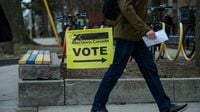The 45th Canadian General Election is set to unfold on April 28, 2025, with polling stations open from 9 am to 9 pm local time across the country. As leaders of the major political parties criss-cross the nation in the final days of campaigning, the atmosphere is charged with anticipation and tension, especially following a mass crowd attack in Vancouver that has altered campaign schedules.
Liberal Leader Mark Carney, Conservative Leader Pierre Poilievre, NDP Leader Jagmeet Singh, and Green Party Co-Leader Elizabeth May have all made adjustments to their itineraries in light of recent events. Carney delivered a prime ministerial message while skipping two campaign stops, Singh dropped three meet-ups to visit a church, and May attended a service as well.
As the election draws near, many eyes are on British Columbia, where the results could significantly influence the overall outcome of the election. With 343 ridings across the country, the 45th Parliament will consist of 343 Members of Parliament, and the voting results in BC may tip the scales towards a majority or minority government.
In Vancouver Island, the NDP is striving to maintain its stronghold, aiming to hold onto the six seats it has dominated since 2011. Key incumbents like Alistair MacGregor in Cowichan-Malahat-Langford, Gord Johns in Courtenay-Alberni, and Laurel Collins in Victoria are expected to play pivotal roles in the election. The Green Party, led by Elizabeth May, is also focusing on retaining its single seat in Saanich-Gulf Islands while attempting to make gains in Nanaimo-Ladysmith.
The Liberals are actively working to flip some of the NDP's orange seats to red, particularly in southern Vancouver Island. Carney has made multiple visits to Victoria and has expressed his fondness for the region, where the Liberals have not held a seat since 2008. Meanwhile, the Conservatives are eyeing potential victories in central and northern Island ridings.
Key issues dominating the campaign include the US economic threat, affordability, housing, and healthcare, particularly concerning mental health and public safety. Polling data shows fluctuating support among the parties, with a recent Nanos poll indicating the Liberals at 42%, Conservatives at 39%, and the NDP at 10%. This reflects a slight increase for the NDP compared to previous polling.
As the election approaches, new Canadians are preparing to make their voices heard. Owen Guo, a 38-year-old Chinese immigrant, is voting for the first time after becoming a citizen just five months ago. Guo's journey from China, where he faced restrictions on free speech as a journalist, to Canada, where he can now participate in democracy, highlights the significance of this election for many.
According to a recent survey by the Institute for Canadian Citizenship, 92% of newly naturalized citizens plan to vote, with affordability and healthcare being their top concerns. The survey also revealed that 36% support the Liberals, while 29% favor the Conservatives, with a notable 17% remaining undecided—double the national average.
On Vancouver Island, the political landscape is particularly dynamic. The NDP's Tanille Johnston, running in North Island-Powell River, faces a challenging race against Conservative candidate Aaron Gunn, who has garnered significant support as a right-wing influencer. Johnston, an Indigenous candidate, emphasizes her commitment to community issues and respectful politics, despite polling showing Gunn leading with 45% support compared to her 23%.
Johnston's campaign highlights the importance of equity issues, such as childcare and healthcare, which she believes should be prioritized over strategic voting discussions. The election has sparked conversations about the potential impact of voter anxiety stemming from economic concerns and the looming threat of US tariffs.
As election night approaches, the stakes are high, with many voters eager to see how their choices will shape the future of Canada. The national TV coverage will begin at 6 pm ET, providing analysis and insights as results start pouring in after polls close at 9 pm local time. This election is being viewed as consequential for the future economy and sovereignty of the nation, and many Canadians are prepared to stay up late to witness the outcome.
In summary, the 45th Canadian General Election is more than a simple vote; it represents a critical juncture in the country’s political landscape, with significant implications for its future. As Canadians prepare to cast their ballots, the blend of local issues, national concerns, and the voices of new citizens will undoubtedly shape the direction of the government for years to come.





